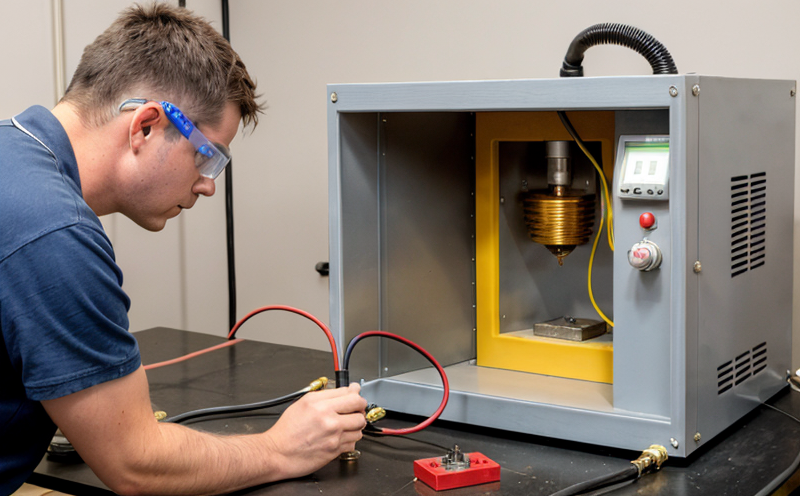ASTM A804 DC Permeability of Alloys
The ASTM A804 standard specifies a method for determining direct-current (DC) permeability and magnetic field strength of metallic materials. This test is crucial in the metallurgy sector as it helps in understanding the magnetic properties of alloys, which are critical for various applications including electrical components, transformers, and sensors.
The DC permeability test measures how easily a material allows magnetic flux to pass through under the influence of an external magnetic field. This property is essential for materials used in devices that rely on electromagnetic interactions such as motors, generators, and medical imaging equipment like MRI machines.
During this test, specimens are subjected to a DC magnetic field, which is then measured using a permeameter. The results provide insights into the material's ability to retain magnetization and its coercivity. Coercivity is the measure of how much magnetic field strength must be applied in opposition to the internal magnetic field before the material becomes demagnetized.
The ASTM A804 method is widely used across industries, particularly in aerospace, automotive, and electronics sectors where precision in material selection is paramount. It ensures that materials meet specific performance criteria, enhancing product reliability and safety. The test results can also influence research and development by guiding the formulation of new alloys with tailored magnetic properties.
The procedure outlined in ASTM A804 involves several steps including specimen preparation, calibration of equipment, application of a DC magnetic field, measurement of permeability, and calculation of coercivity. Specimens are typically prepared to standard dimensions for consistency in testing. Calibration ensures the accuracy of measurements, which is critical given the precision required.
Understanding the results from ASTM A804 tests can significantly impact various aspects of material science and engineering. For instance, it aids in compliance with international standards such as ISO 9001 for quality management systems, ensuring that all processes are controlled and documented to meet specified requirements.
In summary, ASTM A804 DC permeability testing is a fundamental tool in the metallurgy sector that contributes to the development of materials with reliable magnetic properties. By providing detailed insights into material behavior under magnetic fields, this test supports the design and manufacturing processes across diverse industries.
Why It Matters
The importance of ASTM A804 testing cannot be overstated in ensuring product quality and safety. Magnetic properties play a vital role in many products, from electronic devices to infrastructure components. For instance, in the automotive industry, materials with precise magnetic characteristics are essential for electric vehicle (EV) motors and power electronics.
Understanding DC permeability helps manufacturers select alloys that not only meet performance standards but also ensure durability under varying operating conditions. This knowledge is crucial for compliance with regulations such as the EU's Restriction of Hazardous Substances Directive (RoHS), which aims to reduce environmental impact by limiting hazardous substances in electronic and electrical equipment.
The test results are instrumental in optimizing product design, reducing material waste, and improving overall efficiency. By adhering to ASTM A804 standards, companies can enhance their reputation for quality and sustainability, gaining a competitive edge in the global market.
- Enhanced Product Reliability: Ensures that materials perform consistently under magnetic fields, reducing the risk of product failure.
- Regulatory Compliance: Helps businesses meet international standards and environmental regulations.
- Cost Efficiency: By selecting appropriate alloys upfront, companies can minimize rework and waste, leading to lower production costs.
Quality and Reliability Assurance
The ASTM A804 test contributes significantly to quality control by providing a standardized method for evaluating the magnetic properties of metallic materials. This ensures that all batches of alloys undergo consistent testing, leading to reliable and repeatable results.
The test is particularly useful in maintaining product consistency across different production runs or suppliers. By adhering to ASTM A804 standards, manufacturers can ensure that their products meet the required specifications, thereby enhancing customer satisfaction and trust.
Quality assurance through ASTM A804 testing also helps in identifying potential issues early in the manufacturing process. This proactive approach allows for corrective actions to be taken before the product reaches the market, reducing costly recalls and improving overall efficiency.
Environmental and Sustainability Contributions
The ASTM A804 test plays a role in promoting sustainability by ensuring that materials used in critical applications are optimized for performance while minimizing environmental impact. By selecting alloys with the right magnetic properties, manufacturers can reduce the need for frequent replacements due to poor performance or early failure.
This contributes to longer product lifecycles and reduced waste generation. Additionally, compliance with ASTM A804 standards ensures that products are environmentally friendly, aligning with global sustainability goals. This is particularly important in sectors like aerospace and electronics, where materials play a crucial role in reducing carbon footprints.





